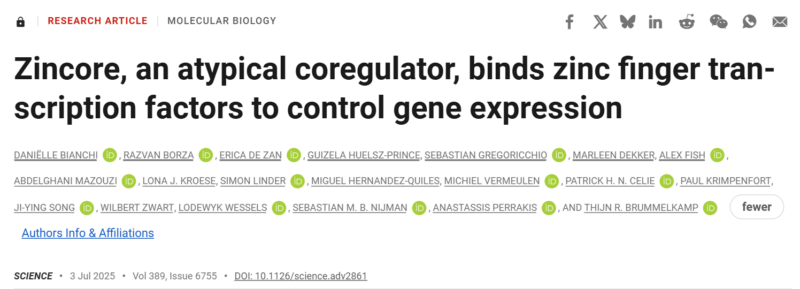The Netherlands Cancer Institute shared a post on LinkedIn about a paper by Daniëlle Bianchi et al. published in Science:
“Scientists at the Netherlands Cancer Institute have made a remarkable discovery: a new protein duo that can turn genes on and off. They have named this duo Zincore. Together, these proteins help other proteins bind more firmly to the DNA, allowing them to perform their functions more effectively. This finding offers greater insight into the way cells work, as well as what goes wrong in certain hereditary diseases.
All our cells contain the same DNA, but behave differently. Nerve cells transmit signals, for example, while skin cells protect our body from the outside world. That’s because different parts of the DNA are active in different cells. Cells have many switches for DNA, determine which parts of the DNA are turned on or off, just like a conductor determines which instruments play and when. This allows a cell to conduct their own inner ‘symphony’, controlling how a cell behaves and whether it becomes, say, a heart cell or a skin cell.
Thijn Brummelkamp’s research group at the Netherlands Cancer Institute discovered a new way in which these switches turn on DNA. Danielle Bianchi and her colleagues from the research group stumbled upon a previously unknown protein duo.
‘Zincore uses a completely new method to help proteins bind better to DNA. We gave the protein pair the name Zincore because it controls an important group of switches known as ‘zinc fingers.’ ‘
The researchers observed that the switches controlled by Zincore work less effectively in cancer cells from patients than in healthy tissue. Two hereditary disorders cause a mutation in one of the genes required to produce Zincore proteins. One such example is Ververi-Brady syndrome, in which the body does not develop properly. Scientists hope that further research will improve understanding of the development of such diseases.
During the study, scientists often reached a dead end.
‘In science, you need a lot of perseverance to understand something in great detail, but we also realized that the discovery of Zincore is actually part of a larger puzzle.
The best moment was when everything came together, thanks to very close collaboration between several research groups with different expertise. After years of hard work, we have now discovered something that has a major impact on our cells.
We now have a better understanding of how they work and can conduct more precise investigations into the way they turn their DNA on and off. We suspect that important signals influence Zincore’s activity, affecting the behavior of our cells. That will be our focus going forward,’ says Bianchi.
Read the paper.”
Title: Zincore, an atypical coregulator, binds zinc finger transcription factors to control gene expression
Authors: Daniëlle Bianchi, Razvan Borza, Erica De Zan, Guizela Huelsz-Prince, Sebastian Gregoricchio, Marleen Dekker, Alex Fish, Abdelghani Mazouzi, Lona J. Kroese, Simon Linder, Miguel Hernandez-Quiles, Michiel Vermeulen, Patrick H. N. Celie, Paul Krimpenfort, Ji-Ying Song, Wilbert Zwart, Lodewyk Wessels, Sebastian M. B. Nijman, Anastassis Perrakis, Thijn R. Brummelkamp.
You can read the Full Article in Science.

You can find more posts featuring The Netherlands Cancer Institute in OncoDaily.


